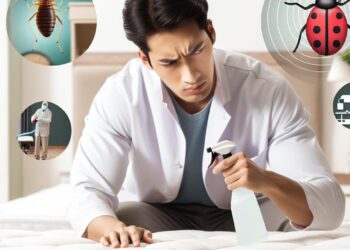Dealing with bed bugs? It can creep anyone out, and that’s understandable! They’re not just a nuisance but can impact your home, health, and even business. Stepping into the world of homemade bed bug spray recipes can be a game changer. You see, having a powerful yet natural solution on hand can save both your peace of mind and your pocket. Controlling these pests is crucial; not only do they cause physical discomfort with itchy bites, but they can also lead to sleepless nights and stress. In this blog, we’ll guide you through understanding bed bugs and other annoying pests while sharing practical solutions to protect your home. Here, you’ll find effective prevention methods using simple ingredients and tips! The aim is to arm you with knowledge to keep your house safe and stress-free.
Understanding a Homemade Bed Bug Spray Recipe
When we think of pesky invaders, bed bugs often top the list. But did you know you can whip up a homemade bed bug spray with simple ingredients? This spray typically includes a combination of water, essential oils like lavender or tea tree, and sometimes vinegar or alcohol for added potency. Bed bugs are small, reddish-brown insects known for their fondness for human and warm-blooded animal blood, mostly as you sleep. Found commonly in beds, seams of mattresses, headboards, and even in crevices like cracks in walls or floors, these critters are excellent at hiding. So, what are the telltale signs you’ve got an infestation? Look for small, rust-colored spots on bedding, which are the bugs’ droppings, or tiny, itchy bites on your skin. A musty odor might waft through an infested room, too. Alongside causing discomfort, their presence can lead to sleepless nights and potential allergic reactions.Common Pitfalls of Using Homemade Bed Bug Spray Recipes
Ever wondered what could go wrong with using a homemade bed bug spray recipe? Although creating your own spray might seem like a budget-friendly solution, there are several potential pitfalls you might encounter. Here are some common problems associated with using homemade bed bug sprays:- Structural Damage: If the concoction isn’t balanced in terms of acidity or base, it might cause discoloration or damage to paints, wallpapers, or wooden surfaces. The harsh chemicals or oils might seep into the walls, causing longer-term structural concerns.
- Health Risks: Breathing in or accidentally ingesting certain homemade concoctions can pose significant health risks, particularly if the ingredients include harsh chemicals not meant for safe indoor use. It could lead to respiratory problems or skin irritations, especially for individuals with allergies or sensitive skin.
- Food Contamination: If houses are sprayed without proper caution, the substances might find their way into food storage areas or onto kitchen surfaces, resulting in contamination. This means you could inadvertently consume substances that aren’t safe for ingestion.
- Property Devaluation: Recurring pest issues and visible damage could lower your property’s value. Potential buyers will be wary of a history of infestation and the visible wear-and-tear caused by improper pest control measures.
- Damage to Pets and Gardens: Pets can be incredibly sensitive to certain ingredients in homemade sprays, potentially leading to illness or discomfort. Similarly, any overspray that impacts your outdoor plants could harm local flora, impacting your garden’s health and aesthetics.
Crafting Effective Natural & Home Remedies for Bed Bug Control
-
Essential Oils: Essential oils like tea tree, lavender, and peppermint, are great for repelling pests. Mix a few drops with water, and spray around affected areas. The scent is pleasant to humans but keeps bugs at bay. Our homemade bed bug spray recipe often includes these oils for their natural insect-repellent properties. They’re safe, eco-friendly, and highly effective in disrupting pests.
-
Vinegar: White vinegar is a powerful, non-toxic option against pests. Its strong smell and acidic nature make it a natural deterrent. Pour undiluted vinegar into a spray bottle, and target problem areas, like crevices and corners, to ward off bugs. Though it won’t eliminate the problem entirely, it’s a useful preventative measure.
-
Natural Predators: Did you know you can introduce beneficial insects to your garden to manage pests naturally? Ladybugs, for example, love to feast on aphids. Encouraging these little helpers can keep pest populations in check without resorting to chemicals.
-
Herbs: Certain herbs, like basil, mint, and rosemary, can be used to repel pests. Grow them in your garden or place them in pots around your home. Not only do they smell amazing, but they also act as a natural deterrent due to their strong aromas that pests find overwhelming.
-
DIY Traps: Simple traps can catch a variety of insects. For instance, mix sugar and borax to form bait for ants. Place it in shallow dishes near trails, and the pests will take it back to their colonies. It’s a straightforward and effective strategy for addressing infestations.
-
Garlic Spray: Crush a few cloves of garlic and mix them with water for a natural spray. This mixture can be effective in deterring pests due to its potent smell. Spray it on plant leaves or areas where bugs are frequent. It’s a safe, homemade alternative that can be whipped up in no time.
Chemical treatments aren’t always safe; try homemade bed bug sprays.
Hey there, bug battler!
Before you dive into chemicals for dealing with those pesky bed bugs, it’s key to know what’s what. So, let’s look at some effective options you might find in a homemade bed bug spray recipe. Seriously, taming these critters isn’t always about reaching for the strongest stuff. Sometimes, it’s about being smart with what you choose.
- Rubbing Alcohol: Just spray it directly on the bed bugs and their nests for a fast, effective kill, as it dries them up quickly.
- Tea Tree Oil: Dilute a few drops with water in a spray bottle and spritz it around infested areas to repel and kill bed bugs naturally.
- Vinegar: Use white vinegar in a spray bottle and apply it generously to mattress seams and bed frames. It’s a great disinfectant and irritates and repels bed bugs.
- Essential Oil Blend: Create a mixture of lavender, peppermint, and eucalyptus oils diluted with water, and spray it on bedding and furniture as a natural deterrent that’s tough on pests but gentle on humans.
Tips to Prevent Bed Bugs: Keep Them Away Effectively
It’s important to stay on top of potential pest problems before they become absolute nightmares. An effective way to ensure your home stays pest-free is by adopting prevention strategies. Here’s a structured list to guide you through:- Proper Waste Disposal and Cleanliness: Keep your home tidy and dispose of rubbish regularly. Pests like rodents and cockroaches are attracted to leftover food and rubbish bins.
- Sealing Entry Points and Cracks: Regularly inspect your home for cracks and holes that might serve as entry points for pests. Use caulk or other appropriate materials to seal them.
- Using Pest Deterrents: Install screens on windows and doors to prevent pests from entering. Consider using natural deterrents like essential oils or herbs, which can be effective and non-toxic.
- Regular Inspections and Maintenance: Schedule regular inspections for signs of pests. Look for droppings, nest materials, or unusual smells. If needed, consult professional pest control services for a thorough check.
- Garden Maintenance: Keep your garden neat and remove any debris, as these can attract pests. Trim trees and bushes to keep them from touching your house, preventing easy access to pests.
- Proper Food Storage: Store food items in airtight containers to keep them safe from pests. Ensure your pantry is clean and free of crumbs.
- Check for Leaks: Fix any leaks promptly, as moisture can attract pests like termites and mould-producing insects.
- Pet Care: If you have pets, make sure their bowls are clean and food is not left out for too long, as this can attract pests like ants or flies.
Debunking Common Myths About Homemade Bed Bug Spray Recipes
| Myth | Fact |
|---|---|
| Homemade sprays kill bed bugs instantly. | Homemade bed bug sprays might not provide immediate results as professional treatments require time to act. |
| Using more ingredients makes a spray more effective. | The effectiveness often lies in the right combination and concentration of ingredients, not just quantity. |
| All natural ingredients are safe for everyone. | Even natural ingredients can cause allergic reactions, so test in a small area or check for allergies first. |
| Essential oils alone can eliminate a bed bug infestation. | Essential oils may deter bed bugs temporarily, but they rarely eliminate an entire infestation without other methods. |
| Spraying once will solve the problem. | Consistent application and combining with other strategies are necessary for effective pest control. |
















